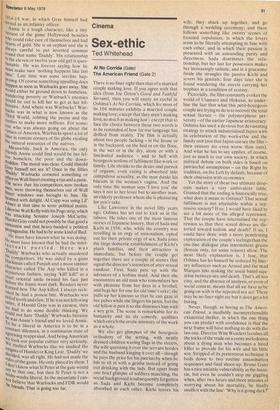Cinema
Sex-ethic
Ted Whitehead
Al No Corrlda (Gate) The American Friend (Gate 2) There is no finer sight than that of a married couple making love. If you agree with that idea (from Joe Orton's Good and Faithfid Servant), then you will enjoy an eyeful in Oshima's Ai No Corrida, which for most of its 104 minutes exhibits a married couple making love; except that they aren't making love, so much as making lustexcept that to face the choice between those two words is to be reminded of how far our language has drifted from reality. The film is actually about two people fucking in the house or in the backyard, on the bed or on the floor, in the wet or in the dry, alone or with a fascinated audience and to hell with bourgeois notions of fulfilment like work or family. Life shrinks to the desire and pursuit of orgasm; even eating is absorbed into compulsive sexuality, as the man dunks his biscuits in the woman's vagina. And the only time the woman says 'I love you' she gays it not to her lover but to another man, an elderly professor whom she is pleasuring for yen's sake.
Like Lawrence in the novel fifty years ago, Oshima has set out to kick us in the taboos. He takes one of the most famous stories of Japanese history, that of Sada and Kichi in 1936, who, while the country was
revelling in an orgy of nationalism, opted
out for their private orgy of sex. Sada joins
the large domestic establishment of Kichi's plush familias, and their attraction is immediate, but before the couple get together there are a couple of scenes that signal the director's intention of utter sexual candour. First, Sada puts up with the advances of a lesbian maid. And then she encounters an old man who remembers her with pleasure from her days in a brothel, and begs her for one for old time's sake; she pulls up her kimono so that he can gaze at her pubes while she fingers his penis, but the old fellow is past it so she dismisses him with a wry grin. The scene is remarkable for its humanity and its sly comedy, qualities which enrich the erotic intensity of the work as a whole. We also get glimpses of the bourgeois orthodoxy of the setting, with neatly dressed children waving flags in the streets, the wife queening it over the servant hordes and the husband kinging it over all though he pays the price for his patriarchy when he has to sit in with a geisha instead of going out drinking with the lads. But apart from one brief glimpse of soldiers marching, the social background is subsequently forgotten as Sada and Kichi become completely absorbed in each other. Kichi leaves his wife, they shack up together, and go through a wedding ceremony; and there follows something like twenty scenes of frenzied copulation, in which the lovers seem to be literally attempting to fuse with each other, and in which their passion is presented with an astounding purity and directness. Sada dominates the relationship, but her lust for possession makes her increasingly sadistic, and in a gruesome finale she strangles the passive Kichi and severs his genitals; four days later she is found wandering the streets carrying her trophies in a condition of ecstasy. Pictorially, the film constantly evokes the world of Utamaro and Hokusai, to underline the fact that what this petit-bourgeois couple are trying to do is to recover the total sexual licence the polymorphous perversity -of the earlier Japanese aristocracy. Oshima has used a devious but devastating strategy to attack industrialised Japan with its celebration of the work-ethic and the family unit (not that Japan can see the film their censors are even worse than ours). And what he has to say applies, of course, just as much to our own society, in which political debate on both sides is based on patriarchal assumptions on the Right by tradition, on the Left by default, because of their obsession with economies.
Yet the story of these two ultimate dropouts makes a very ambivalent fable. Granted that the ending is historically true, what does it mean to Oshima? That sexual fulfilment is not attainable within a repressive society? If so, I would have liked to see a bit more of the alleged repression. That the couple have internalised the repression so that their sexual 'drives are distorted toward sadism and death? If so, I could have done with a more penetrating exploration of the couple's feelings than the one-line dialogue plus intermittent grunts (female only, for some reason) allow. The most likely explanation is, I fear, that Oshima has let himself be seduced by literary influences such as Artaud and the mad Marquis into making the usual banal equation between sex and death. That's all too easy, and the absence of analysis, or even of social context, means that all we have to be going on with is the repeated sex act. There may be no finer sight etc but it does get a bit boring. Never, though, as boring as The American Friend, a modishly incomprehensible existential thriller, in which the one thing you can predict with confidence is that the next frame will have nothing to do with the last one. Director Wim Wenders lavishes all the tricks of the trade on a corny melodrama about a dying man who becomes a hired killer to provide for his wife and his little son. Stripped of its pretentious technique it boils down to two routine assassination sequences and final shoot-up. Bruno Ganz has a nice amiable vulnerability as the assassin, but even he couldn't stop me giggling when, after two hours and three minutes of worrying about his mortality, he finally snuffs it with the line: 'Why is it going dark?'






































 Previous page
Previous page